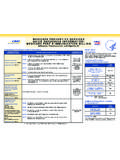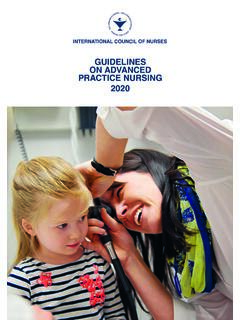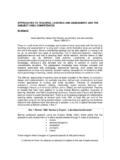Transcription of General Medicare Guidelines on Billing for Non-Physician ...
1 Frequently Asked Questions (FAQ s) and General Medicare Guidelines on Billing for Non-Physician Extender Visits What is a Non Physician practitioner ? Non-Physician Practitioners (NPPS) fall into 2 broad categories: Physician Assistants (PAs) and advanced Practice Nurses (APNs or ARNP s) In addition to covering PA services that are billed incident to a physician's care, Medicare now covers PA services billed separately under a PA's own provider identification number NPI, provided the following conditions are met: They are considered physicians' services when furnished by a physician, They are performed by a person who meets the definition of a PA, They are not otherwise excluded from coverage by law, They are performed under the supervision of a physician, State law allows PA s to perform the services. Medicare also covers services and supplies furnished incident to a PA's covered services. What is a PA? To be considered a PA under Medicare 's definition, a provider's qualifications must meet the applicable state requirements for PA s and at least one of the following conditions: The provider must be currently certified by the National Commission on Certification of Physician Assistants to assist primary care physicians.
2 The provider must have satisfactorily completed a formal educational program that prepares PA s to assist primary care physicians. The program must be at least one academic year in length, consist of supervised clinical practice and at least four months of classroom instruction, and be accredited by the AMA's Committee on Allied Health Education and Accreditation. The provider must have satisfactorily completed a formal educational program that prepares PA s to assist primary care physicians but that does not meet the requirements above and must have been assisting primary care physicians for a total of 12 months during the 18 months immediately preceding Jan. 1, 1987. What is the supervision requirement for PAs? To satisfy Medicare requirements, the PA must work with a physician supervisor who is primarily responsible for the overall direction and management of the PA's professional activities and for ensuring that the services provided are medically appropriate.
3 The physician supervisor need not be present when the PA furnishes a service, unless state law provides otherwise. If the physician supervisor is not present, he or she must be immediately available to the PA for telephone consultation. How are PA(s) reimbursed? The carrier or A/B MAC will pay for PA services at the lesser of the actual charge or 85 percent of the Medicare Physician Fee Schedule (MPFS). PA assistant-at-surgery services are paid to the employer of the PA by the carrier or A/B MAC at 85 percent of 16 percent of the MPFS. What is an advanced Practice nurse ? An advanced Practice nurse (APN or ARNP) is an umbrella term for Registered Nurses. Most APN s have a master s degree and have completed additional clinical practice requirements. There are four principal types: 1. Certified Registered nurse Anesthetists (CRNA); 2. nurse Practitioners (NP); 3. Certified nurse -Midwives (CNM); and 4. Clinical nurse Specialists (CNS). An APN provides care in a variety of settings across the healthcare continuum from primary to specialized care.
4 An APN is regulated by state law; some states allow independent practice authority while others require physician collaboration; and An APN is permitted to prescribe medications either independently or in collaboration with a physician in all 50 states. How are NPs reimbursed? In General , the NP is paid for covered services at 85 percent of the Medicare Physician Fee Schedule (MPFS). What are some examples of NP covered services? A nurse practitioner (NP) is a nurse with a graduate degree in advanced practice nursing . This allows him or her to provide a broad range of healthcare services, including: Taking the patient s history, performing a physical exam, and ordering appropriate laboratory tests and procedures; Diagnosing, treating, and managing acute and chronic diseases; Providing prescriptions and coordinating referrals; and Promoting healthy activities in collaboration with the patient. How are services shared between a physician and a NPP (Non physician practitioner ) billed Split/Shared E/M Service Office/Clinic Setting In the office/clinic setting when the physician performs the E/M service, the service must be reported using the physician s NPI.
5 When an E/M service is a shared/split encounter between a physician and an NPP, the service is considered to have been performed incident to if the requirements for incident to are met and the patient is an established patient. If incident to requirements are not met for the shared/split E/M service, the service must be billed under the NPP s NPI, and payment will be made at the appropriate MPFS payment. I am a physician and I employ an NP. She takes the history and performs the physical examination, then we discuss the diagnosis and treatment plan, and she implements the plan. I cosign the chart. Will my signature suffice in getting reimbursement under my name? A physician's co signature is not useful in obtaining reimbursement. If Billing Medicare under the incident-to rules, a physician must follow the incident-to rules, which say nothing about co signature. For example, if an NP conducts a visit with a new patient, the practice must make a choice -- bill the visit under the NP's provider number or bill the visit under the physician's provider number, and have the physician, not the NP, perform and document the portions of the evaluation relevant to the choice of procedure code.
6 The physician's signature or writing "agree" on an NP's evaluation will not suffice for Medicare . Other insurers may have different rules, but no insurer pays extra if a physician cosigns an NP's records. Medicare Collaboration and Supervision Requirement CMS requires the Collaboration Requirement be met that is, Non-Physician extender services are covered only if, among other things, that the Non-Physician extender performed them while working in collaboration with a physician. Collaboration is a process in which a nurse practitioner works with one or more physicians to deliver health care services within the scope of the nurse practitioner s professional expertise, with medical direction and appropriate supervision as required by the law of the State in which the services were furnished. For Medicare Billing purposes, when Billing under the nurse practitioner benefit (and not as an "incident to" service), the collaborating physician does not need to be present with the nurse practitioner when the services are furnished.
7 Supervision requirements are set by state law. Florida Statue regulates the supervision of non physician practitioners who are not co-located with the physician as follows: Subsection 3. All such offices that are not the physician's primary place of practice must be within 25 miles of the physician's primary place of practice or in a county that is contiguous to the county of the physician's primary place of practice. However, the distance between any of the offices may not exceed 75 miles. Subsection 4. The physician may supervise only one office other than the physician's primary place of practice except that until July 1, 2011, the physician may supervise up to two medical offices other than the physician's primary place of practice if the addresses of the offices are submitted to the board before July 1, 2006. Effective July 1, 2011, the physician may supervise only one office other than the physician's primary place of practice, regardless of when the addresses of the offices were submitted to the board.
8 Hospital Inpatient/Outpatient/Emergency Department Setting When a hospital inpatient/hospital outpatient or emergency department E/M service is shared between a physician and an NPP from the same group practice, and the physician provides any face-to-face portion of the E/M encounter with the patient, then the service may be billed under either the physician s or the NPP s NPI. However, if there was no face-to-face encounter between the patient and the physician ( , even if the physician participated in the service by only reviewing the patient s medical record) then the service may only be billed under the NPP s NPI. Payment will be made at the appropriate MPFS rate based on the NPI entered on the claim. Can services provided by NPPs in a hospital outpatient department or emergency department be billed to Medicare under a physician's provider number? Incident-to Billing is not allowed in a hospital. The services must be billed under the NP's provider number, assuming no other provider has billed the service and the NP's salary has not been reimbursed by Medicare under the hospital's cost report.
9 Where can NPP s provide service? Medicare covers Advance Practice Nurses (APN) and Physician Assistants (PA) Evaluation and Management (E/M) services provided to patients residing in various places of service. In addition to those previously discussed, these also include: Domiciliary, Rest Home ( , Boarding Home) or Custodial Care Services, and Residential Substance Abuse Facility services; Home Services ( , a private residence); and Skilled nursing Facility (SNF) Health First Network will require the Physician Assistant or nurse practitioner to be working under the direction of a contracted Health First Network Physician.








